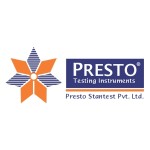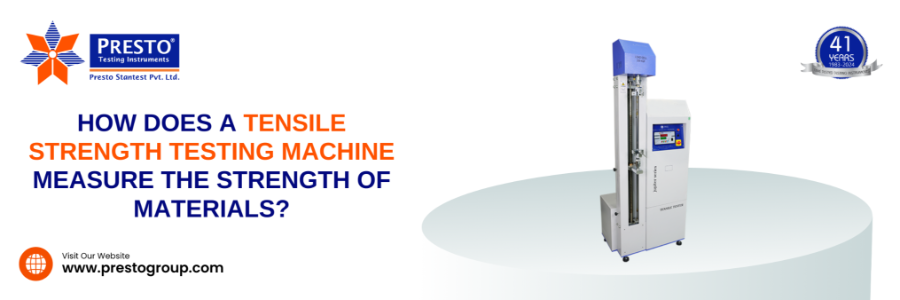In today's competitive manufacturing environment, ensuring the quality and durability of materials is paramount. This is where the tensile strength tester becomes an invaluable tool. Used across various industries, from textiles to plastics, metals, and composites, a tensile strength tester provides critical data about a material's strength and durability. This blog delves into the significance, functionality, and advantages of using a tensile strength tester, with a focus on the advanced digital models available in the market.
Understanding Tensile Strength Testing
Tensile strength testing involves applying a uniaxial force to a material until it breaks. This test helps determine several key material properties, including tensile strength, yield strength, elongation, and modulus of elasticity. These properties are crucial for predicting how materials will behave under different types of forces in real-world applications.
A tensile strength tester measures the resistance of a material to a force that tends to pull it apart. The results help in understanding the material's performance capabilities and ensure that it meets the required standards and specifications.
The Role of Digital Tensile Strength Testers
Traditional tensile testers, though effective, often come with limitations in terms of precision and ease of use. Digital tensile strength testers, like the ones offered by Prestogroup, bring a new level of accuracy and convenience to material testing. These advanced instruments are equipped with digital displays, automated controls, and data recording capabilities, making the testing process not only more accurate but also more efficient.
Key Features of Digital Tensile Strength Testers
- High Precision and Accuracy: Digital tensile strength testers offer precise measurements with high accuracy, thanks to their advanced load cells and sensors. This precision is crucial for industries where even minor deviations can lead to significant issues in product quality and performance.
- Automated Testing Procedures: These testers come with automated testing procedures, reducing the chances of human error and ensuring consistent results. Automation also speeds up the testing process, allowing for quicker decision-making and production adjustments.
- User-Friendly Interface: Modern digital testers are designed with intuitive user interfaces, making it easier for operators to set up tests, monitor progress, and analyze results. This user-friendly design reduces the learning curve and increases productivity.
- Comprehensive Data Analysis: With digital tensile strength testers, users can easily record, store, and analyze data. This capability is essential for quality control and research and development, providing valuable insights into material properties and performance.
- Versatility: Digital tensile testers are versatile and can be used to test a wide range of materials, including metals, plastics, rubber, textiles, and composites. This versatility makes them a valuable asset for various industries.
Applications of Tensile Strength Testers
Tensile strength testers find applications in numerous industries, each benefiting from the detailed insights these tests provide.
- Automotive Industry: In the automotive industry, tensile strength testing ensures that materials used in vehicle components can withstand the stresses and strains they will encounter during operation. This testing is crucial for safety and durability.
- Aerospace Industry: Aerospace materials must endure extreme conditions and stresses. Tensile strength testing helps in selecting materials that can meet these stringent requirements, ensuring the safety and reliability of aircraft.
- Construction Industry: Construction materials, such as steel and concrete, need to have high tensile strength to support structures. Testing these materials ensures that buildings and infrastructure are safe and durable.
- Textile Industry: In textiles, tensile strength testing determines the durability and quality of fabrics. This is essential for ensuring that garments and other textile products can withstand wear and tear.
- Plastic and Polymer Industry: Tensile strength testing in this industry helps in assessing the performance and durability of plastic products, ensuring they meet the necessary standards for various applications.
Advantages of Using Digital Tensile Strength Testers
- Improved Quality Control: By providing accurate and reliable data, digital tensile testers enhance quality control processes, ensuring that only materials that meet the required specifications are used in production.
- Cost Efficiency: Automated and precise testing reduces the likelihood of material failure, which can be costly in terms of both money and time. Early detection of material defects helps in making informed decisions and avoiding costly recalls.
- Enhanced R&D: In research and development, digital tensile testers provide valuable data that can be used to innovate and improve materials. This capability is crucial for staying competitive in the market.
- Compliance with Standards: Digital tensile testers help companies comply with industry standards and regulations, which is essential for maintaining certifications and avoiding legal issues.
Conclusion
In conclusion, the tensile strength tester is an indispensable tool in the material testing arsenal. The advancements in digital technology have made these testers more accurate, efficient, and user-friendly, providing significant benefits across various industries. By investing in a high-quality digital tensile strength tester, companies can ensure the durability and performance of their materials, ultimately leading to better products and satisfied customers.
As industries continue to evolve, the demand for precise and reliable material testing will only increase. Digital tensile strength testers are poised to meet this demand, providing the data and insights necessary to drive innovation and maintain high standards of quality. Whether in automotive, aerospace, construction, textiles, or plastics, the importance of tensile strength testing cannot be overstated. Investing in the right testing equipment is a step towards ensuring excellence in every product manufactured.






Comments